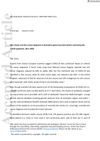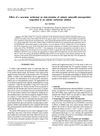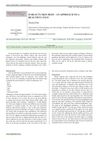 3 citations,
October 2023 in “Frontiers in physiology”
3 citations,
October 2023 in “Frontiers in physiology” ceRNA networks offer potential treatments for skin aging and wound healing.
 3 citations,
May 2021 in “British Journal of Dermatology”
3 citations,
May 2021 in “British Journal of Dermatology” The COVID-19 pandemic led to fewer skin checks and skin cancer diagnoses in Australia in 2020.
 2 citations,
April 2021 in “bioRxiv (Cold Spring Harbor Laboratory)”
2 citations,
April 2021 in “bioRxiv (Cold Spring Harbor Laboratory)” The conclusion is that analyzing RNA from skin oils is a promising way to understand skin diseases.
 2 citations,
February 2014 in “Journal of Crohn's and colitis”
2 citations,
February 2014 in “Journal of Crohn's and colitis” Some IBD patients on anti-TNFs developed severe skin issues, but ustekinumab helped.

research Skin
2 citations,
January 2011 in “Elsevier eBooks” Skin problems are common in Lupus patients and can indicate the disease's severity, requiring specific treatments and lifestyle changes.
 2 citations,
November 2009 in “Korean journal of chemical engineering”
2 citations,
November 2009 in “Korean journal of chemical engineering” Adding Brij 78 to minoxidil microparticles in a certain solution helps them stick to the skin better and prevents clumping.
 1 citations,
October 2023 in “Romanian Journal of Morphology and Embryology”
1 citations,
October 2023 in “Romanian Journal of Morphology and Embryology” COVID-19 can cause various skin issues, but long-term skin problems are rare.
 1 citations,
January 2023 in “Frontiers in veterinary science”
1 citations,
January 2023 in “Frontiers in veterinary science” Activating autophagy in dogs with certain diseases improves their skin and hair.
 1 citations,
July 2022 in “Functional foods in health and disease/Journal of functional foods in health & disease”
1 citations,
July 2022 in “Functional foods in health and disease/Journal of functional foods in health & disease” Taking a probiotic supplement twice a day improved hair growth, skin hydration, and metabolic health in adults at risk of metabolic syndrome.
 1 citations,
May 2022 in “Frontiers in medicine”
1 citations,
May 2022 in “Frontiers in medicine” Metformin helps improve skin regeneration by increasing the growth of skin stem cells.
 1 citations,
January 2018 in “Stem cell biology and regenerative medicine”
1 citations,
January 2018 in “Stem cell biology and regenerative medicine” DNA methylation is essential for skin and hair follicle development, and could be a target for treating skin diseases.
 1 citations,
December 2014 in “Scanning”
1 citations,
December 2014 in “Scanning” Multiphoton microscopy effectively images rabbit skin structures in detail without staining and shows differences from human skin.
 February 2024 in “Asian journal of medical sciences”
February 2024 in “Asian journal of medical sciences” Proper hygiene, adequate sleep, and self-care can reduce common skin diseases.
 January 2022 in “Medical research archives”
January 2022 in “Medical research archives” Taking vitamin D might improve life for MS patients and reduce skin side effects from alemtuzumab treatment.
 June 2020 in “International journal of research in dermatology”
June 2020 in “International journal of research in dermatology” Taking choline-stabilized orthosilicic acid orally significantly improved hair, skin, and nail health without side effects.
 April 2019 in “Journal of Investigative Dermatology”
April 2019 in “Journal of Investigative Dermatology” Caffeine can protect scalp hair follicles from damage caused by UV radiation.
 May 2018 in “Actas Dermo-Sifiliográficas”
May 2018 in “Actas Dermo-Sifiliográficas” The Spanish version of the Hair Specific Skindex-29 is a reliable tool for measuring quality of life in Spanish-speaking women with hair loss.
 April 2018 in “Journal of Investigative Dermatology”
April 2018 in “Journal of Investigative Dermatology” Ovol2 is important for proper skin healing and hair growth.
 January 2018 in “Springer eBooks”
January 2018 in “Springer eBooks” Athletes need effective management of skin disorders for their performance and well-being.
 January 2018 in “Stem cell biology and regenerative medicine”
January 2018 in “Stem cell biology and regenerative medicine” ATP-dependent chromatin remodeling is crucial for skin development and stem cell function.
 June 2017 in “Journal of The American Academy of Dermatology”
June 2017 in “Journal of The American Academy of Dermatology” The new treatment was safe and may effectively treat male pattern hair loss.
 February 2017 in “Journal of Aesthetic Nursing”
February 2017 in “Journal of Aesthetic Nursing” Skin needling is a safe, effective, and affordable treatment for various skin issues and enhances other aesthetic procedures.
 December 2016 in “John Wiley & Sons, Ltd eBooks”
December 2016 in “John Wiley & Sons, Ltd eBooks” The document concludes that proper recognition and treatment of skin appendage disorders are important for management.
 October 2016 in “Elsevier eBooks”
October 2016 in “Elsevier eBooks” Common noncancerous skin diseases have various treatments, including topical applications, light therapy, surgery, and medications, with psychological support being important.
 July 2014 in “Nasza Dermatologia Online”
July 2014 in “Nasza Dermatologia Online” True facial beauty is natural, but cosmetic procedures can enhance it temporarily.
 January 2011 in “Web journal anti-aging medicine/Anti-aging medicine”
January 2011 in “Web journal anti-aging medicine/Anti-aging medicine” KGS1 tablets improved skin and hair health.
 110 citations,
January 2014 in “The Journal of Sexual Medicine”
110 citations,
January 2014 in “The Journal of Sexual Medicine” Testosterone treatment in trans men increases body and facial hair and may lead to hair loss over time, but severe skin issues are rare.
 71 citations,
January 2015 in “The Scientific World Journal”
71 citations,
January 2015 in “The Scientific World Journal” Insulin resistance may contribute to various skin diseases and treating it could improve skin health and prevent more serious conditions.
 67 citations,
January 2007 in “Climacteric”
67 citations,
January 2007 in “Climacteric” Estrogens and SERMs can help with skin aging, but their safety and effectiveness need more research.
 60 citations,
April 2012 in “Physiology”
60 citations,
April 2012 in “Physiology” The document concludes that understanding hair and feather regeneration can help develop new regenerative medicine strategies.






























